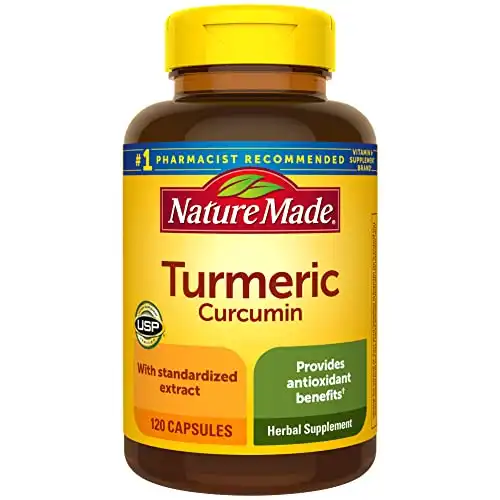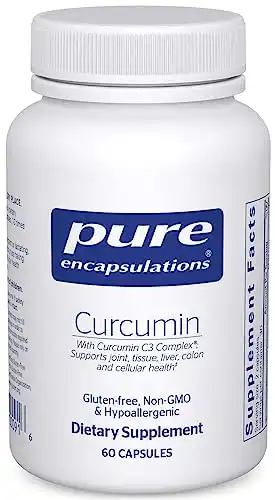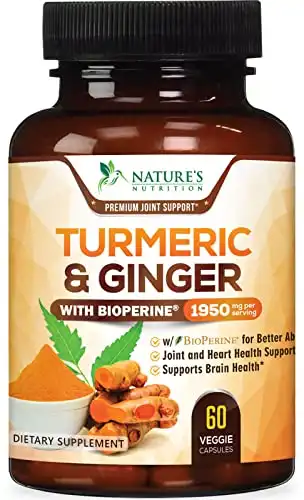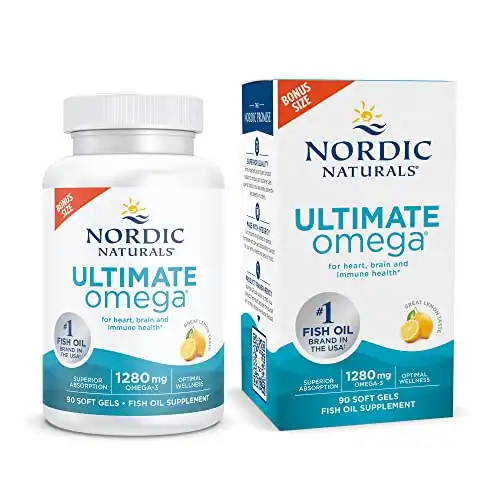This post contains affiliate links. Please see our disclosure policy.
The best anti-inflammatory foods can provide major health benefits for your immune system. By simply incorporating more of these nutrient-dense foods into your diet, you can help avoid chronic inflammation, inflammatory diseases, and other health conditions. Whole foods with anti-inflammatory effects can make a lasting impact on the quality of your life.
We all know that a healthy diet can vastly improve how we feel, how often we get sick, and even our weight loss journey. But do you know exactly which types of food have medicinal properties, and which ones are doing the most harm to your overall health?
Certain foods cause inflammation in the body, and can cause issues like autoimmune diseases, metabolic syndrome, acute inflammation, and other types of immune response. Other foods have powerful antioxidants and anti-inflammatory compounds that actually help your body.
We’re going to explain what inflammation is, how it impacts the body, which foods to avoid, and which foods to eat for a healthier life.

Save This Article To Read Later
What Is Inflammation?
When our bodies encounter something foreign like viruses, bacteria, toxic chemicals, or an injury, it activates our immune system. In response to the alarm, your immune system sends off inflammatory cells to fight the good fight. This is an inflammatory response. These cells try to trap any outside offenders and heal any injured tissue. On the external side, this might look like pain, swelling, bruising, or redness.
So you can see, we need the inflammatory response to heal. It’s an important part of our immune system and overall health.
However, when inflammation doesn’t go away, we need to start paying attention.
Chronic inflammation is when your body continues to send inflammatory cells when there is no reason to. Chronic inflammation has been linked to Alzheimer’s disease, asthma, cancer, heart disease, Rheumatoid arthritis (RA), and Type 2 diabetes.
Autoimmune disorders, exposure to toxins and untreated acute inflammation can all lead to chronic inflammation. There are also some lifestyle factors that may increase your levels of inflammation. Drinking excess alcohol, a high BMI, chronic stress, and smoking can all impact inflammation.
Common Symptoms of Inflammation
The most common symptoms of acute inflammation are:
- Flushed skin at injury site
- Pain and tenderness
- Swelling
- Heat
The most common symptoms of chronic inflammation include:
- Abdominal pain
- Chest pain
- Fatigue
- Fever
- Joint pain
- Mouth sores
Foods That Cause Inflammation
Just like anti-inflammatory foods can add to your foods, there are also foods that actually make it worse. These are the most common foods that cause inflammation. While you’re adding the good nutrition to your diet, you’ll want to avoid the bad stuff too.
Foods that cause inflammation often have ingredients that are tough to digest and process. This can confuse your body and create an inflammatory response.
Try your best to avoid these common inflammatory foods:
- Processed foods
- White bread
- Pastries
- Friend foods
- Snacks (chips, cookies, crackers)
- Soda
- Red meat
- Processed meats (lunch meats, hot dogs, bacon, cured meats)
- Margarine
- Shortening
- Lard
- Highly processed seed oils
Benefits of Anti-Inflammatory Foods
An anti-inflammatory diet will support your immune system by giving it the nutrient rich ingredients it craves. Adding healthy vitamins, minerals, omega-3 fats and anti-oxidants can have a major positive impact on your health.
Some of the most common benefits of anti-inflammatory foods are:
- Lower blood pressure
- Better mental health
- Improved cognitive function
- Chronic issue relief
Top 20 Anti-Inflammatory Foods
Naturally anti-inflammatory foods can help your body stay healthy. Adding these foods to your diet can have both immediate and long term impacts on your quality of life. Here are the top foods that fight inflammation.
Berries
Berries aren’t just beautiful in color; they’re incredibly good for you, too. Of all fruits, they’re packed with the most antioxidants and anti-inflammatory properties. Choices like strawberries, blackberries, cranberries, and blueberries have amazing vitamins, minerals, fiber, and polyphenols.
Citrus Fruits
Berries aren’t the only fruit with great anti-inflammatory benefits. Citrus fruits like oranges, grapefruits, lemons, and limes have powerful levels or vitamin C, giber, potassium, calcium, B vitamins, copper, and anti-inflammatory phytochemicals like flavonoids and carotenoids!
Turmeric
Chinese and Ayurvedic medicine incorporates herbs and spices into their practices regularly as a means to treat a variety of ailments, including inflammation. Turmeric has compounds with anti-inflammatory and antioxidant effects. It’s even been known to control inflammation, pain, and upper respiratory infections. To learn more check out the five health benefits of turmeric.
If you find it difficult to get enough turmeric through nutrition, you can consider adding a high quality supplement to your routine. You may notice “curcumin” on supplement labels, which is the active component of turmeric.
| Product Image | Product Name | Primary Button |
|---|---|---|
Ginger
Ginger has so many healing properties. When taken as a supplement it reduces inflammation in the intestines, and it also aids with digestion. Ginger is known to treat a wide range of diseases with anti-inflammatory responses. Ever since I learned about these amazing health benefits I’ve started more and more ginger into my cooking at home. Seeking out herbs that support a healthy inflammation response can truly help support your whole body and relieve occasional pain.
If you can’t get enough ginger from your diet, you can add a high quality ginger supplement to your routine instead.
Garlic
Garlic is loved by many for it’s high nutrition and low caloric levels. But it also offers great anti-inflammatory benefits. Garlic contains diallyl disulfide, an anti-inflammatory compound. If you have sore or inflamed joints and muscles, you can even rub them with garlic oil. Garlic also helps with fighting off common colds and high blood pressure.
Green Tea
If you love a little green tea as part of your morning routine, you’re in luck! Green tea is packed with antioxidants called catechins, and they reduce inflammation. It has even been known to reduce inflammation-driven conditions like heart disease, Alzheimer’s and certain cancers. Keep in mind green tea has lots of natural caffeine too. This drink is best suited for morning-time so you don’t disrupt any sleep patterns.
Dark Leafy Green Vegetables
Studies have linked vitamin E to cutting the production of cytokine, which is a pro-inflammatory molecule. Dark green vegetables including spinach, kale, broccoli and collard greens offer up high amounts of this vitamin.
To get the most out of your veggies, try to eat them raw as much as you can; in my favorite salad recipes or even healthy smoothies. It’s no surprise that people living in Blue Zones, with the longest life spans in the world, eat all kinds of leafy greens!
I get a boost of nutrition every morning from drinking my favorite AG1 drink. It contains 75 high-quality vitamins, minerals, and whole-food sourced nutrients. It’s a great way to check a lot of items off this list with a simple morning beverage that tastes great!
Almonds
Consuming healthy fats, like nuts, is a great way to fight inflammation. Almonds, in particular, are high in fiber, vitamin E and calcium. Nuts are one of the most overlooked, yet convenient superfoods. Nuts are full of healthy fats and an excellent source of protein. They’re also awash with vitamins and minerals your body needs like magnesium, folate, vitamin E, and the hard-to-get selenium.
Walnuts
Walnuts are high in an omega-3 called alapha-linolenic acid (ALA) that’s been shown to reduce inflammation in cell culture. Studies have confirmed that walnuts have strong antioxidant and anti-inflammatory functions. They also have large quantities of unsaturated fatty acids, peptides, proteins, and phenolic compounds.
Fatty Fish
Omega-3 fatty acids, which are considered pertinent to our health, are known to reduce inflammation in the body. However, our body cannot make them ourselves, so we need to incorporate them into our diet regularly. Oily fish, including salmon, mackerel, tuna and sardines are rich in omega-3 fatty acids which can boost heart health and is an excellent source of protein.
Fatty fishes aren’t always at the top of everyone’s must requested meals list. If adding this healthy food to your diet isn’t an option, try these Omega-3 supplements instead.
Olive Oil
If you’re familiar with the Mediterranean diet it shouldn’t surprise you that residents of Ikaria, Greece love olive oil and other healthy fats. Olive oil is one of the only plant-derived cooking oils and is full of cholesterol-lowering monounsaturated fats. It also contains something called polyphenols, which help reduce the oxidative stress within your body. (Over time, oxidative stress from fried foods, smoke, pollution, and other factors can increase your cancer risk.) The next time you’re preparing a meal, try switching from vegetable or another oil to olive oil. Olive oil is just a healthier alternative, plain and simple.
Seeds
Similar to nuts and fatty fishes, seeds like chia and flaxseeds are high in omega-3 fatty acids. These are proven inflammation fighters and critical for our overall health. Some of my favorite ways to incorporate more seeds into my diet are to add them to my breakfast smoothie, oatmeal, or yogurt.
Beans
Beans are a legume, which is a highly nutrient-dense form of a complex carbohydrate. They give you a slow and steady dose of energy instead of the crash-and-burn you get from refined carbohydrates. They are naturally rich in fiber and protein, loaded with antioxidants, and they keep your digestive habits regular too.
Avocados
Avocados are a rare fruit filled with vitamin E, a micronutrient with anti-inflammatory effects. They also have a high concentration of anti-inflammatory monounsaturated fat. They’ve even been shown to increase good cholesterol, and lower bad cholesterol.
Tomatoes
Tomatoes are a beneficial vegetable that contains tons of nutrients and anti-inflammatory compounds. For example, tomatoes are rich in lycopene which is an antioxidant compound that is thought to have anticancer properties in addition to playing a role in skin health.
Broccoli
Broccoli is absolutely packed with powerful nutrients. It’s rich in antioxidants, vitamins and minerals that protect the body from inflammation. They promote heart health, digestion support, and bone health. Broccoli contains sulforaphane, a sulfur-containing compound that has potent anti-inflammatory properties.
Peppers
Brightly colored foods tend to contain more antioxidants and anti-inflammatory nutrients, and peppers are no different. Bright red peppers contain a chemical compound called capsaicin which is known to help reduce inflammation.
Grapes
Grapes have several powerful properties. They contain anthocyanins, which reduce inflammation. And they also have resveratrol, an antioxidant compound with tons of health benefits including protecting the heart from inflammation.
Cherries
Like some of the other fruits listed above, cherries come packed with a huge punch of benefits. They’re a rich source of polyphenols and vitamin C, which means they have great anti-oxidant and anti-inflammatory properties. These benefits are consistent across different cherry products including fresh cherries, dried cherries, and cherry juice.
Dark Chocolate
Who would have thought dessert could be so good? Dark chocolate is rich in antioxidants, giving it anti-inflammatory effects. The flavanols help reduce inflammation, and the antioxidants help fight inflammation and free radicals. Simply put, a little treat could actually help you stay healthy!
Anti-Inflammatory Diet for Weight Loss
While I don’t recommend any specific diet for weight loss, it is true that eating healthier will certainly impact your weight. Anti-inflammatory diets ditch the sugary processed foods that often make us gain weight in the first place. When we start focusing on healthy whole foods, it’s only natural that our body will shift along with our diet.
The benefit of the anti-inflammatory diet is that by focusing on your internal health and chronic inflammation issues, you actually benefit your whole body health too. Focus on anti-inflammatory foods is a great way to put your health first, and make an impact on how you look and feel as well.
Sample Anti-Inflammatory Diet Plan
So, how exactly do you get started with an anti-inflammatory diet? The main goal is to incorporate as many of the beneficial foods listed above into your diet as you can! You’ll want to ditch the foods that cause inflammation as the same time.
Here are a few anti-inflammatory diet plan ideas to get you started.
Breakfast
Smoothies are a great option for an anti-inflammatory breakfast. Be sure to include berries or citrus fruit, plus nuts or seeds to add an extra punch!
A few of our favorites:
Lunch
Salads are a smart way to pack in multiple anti-inflammatory foods into your meal. Scan the list above for your favorite salad ingredients and mix them all together!
A few of our favorites:
Dinner
Grab a serving of your preferred fatty fish and serve it with a side of green leafy vegetables cooked to your liking.
A few of our favorites:
Snacks
Grab some almond or walnut nut packs to go, or a small cup of a nutrient-dense fruit. You can also check out this list of our favorite healthy snacks.
The right anti-inflammatory foods can help boost your overall health and get rid of uncomfortable chronic inflammation side effects. Start incorporating these powerful foods into your diet to reaps the benefits for a lifetime!







I just watched the documentary “Forks over Knives”. Very educational . I highly recommend it. This information reinforces the scientific data gathered by the doctors in the film. Chris Freytag you are always “spot on” with your information!! I just love Get Healthy U!!
I to watched “Forks Over Knives” and think it is ground breaking in so many aspects.
Recently I read “Childhood Disrupted” by Donna Jackson Nakazawa. I have never understood why I have been plagued with several autoimmune diseases. After reading this awesome book I now understand why. My childhood was an emotional roller coaster and found out this can actually cause a change in your DNA. Passing this along because we all want to get well. Diet and knowledge are POWER.